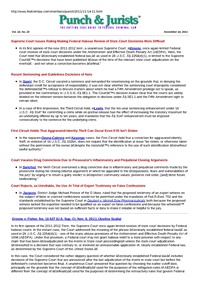Here the Court vacated a sentence because it was unclear whether the sentencing court, in denying credit for acceptance of responsibility, improperly considered the defendant’s refusal to discuss matters covered by his Fifth Amendment privilege.
As evidenced by this decision, the courts continue to struggle with the inherent …
Here a unanimous Court held that “clearly established federal law,” as used in 28 U.S.C. § 2254(d)(1), is limited to the Supreme Court’s decisions that have been published “as of the time of the relevant state court adjudication on the merits”.
In its first opinion of the 2011-2012 …
Here the Court overturned a drug conviction due to inflammatory and prejudicial comments made by the prosecutor during his closing rebuttal arguments in which he improperly appealed to the “passions, fears and vulnerabilities of the jury”.
In this case, the Ninth Circuit took a rare stand against inflammatory …
Here the Court held that a conviction for aggravated identity theft, in violation of 18 U.S.C. § 1028A, does not require that the identification at issue "be stolen, or otherwise taken without the permission of the owner” as stated in the statute.
U.S. v. Ozuna-Cabrera, No. 09-2174 (1st …
Here the Court refused to permit expert testimony about false or coerced confessions after concluding that such testimony was inadmissible under the mandates of Fed.R.Evid. 702 and the standards established by Daubert v. Merrell Dow Pharmaceuticals.
The defendant in this case, Michael Jacques, was arrested, charged and ultimately …
U.S. v. Ozuna-Cabrera, No. 09-2174 (1st Cir. Nov. 2, 2011) (Judge Jeffrey Howard)
U.S. v. Kasenge, No. 09-1896 (1st Cir. Nov. 2, 2011) (Judge Jeffrey Howard)
In these two unrelated decisions, the First Circuit rejected separate challenges to the imposition of the mandatory two-year identity theft sentence enhancement contained …
Here the Court held that the ten-year sentencing enhancement under 18 U.S.C. § 3147 for committing a crime while on pretrial release has the effect of increasing the statutory maximum for an underlying offense by up to ten years.
This case raises a novel and interesting question about …
